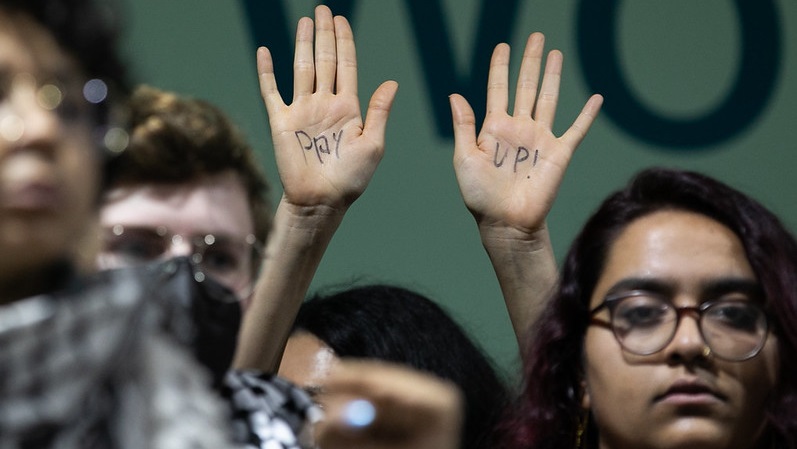After fiery talks, a new post-2025 goal was adopted but some developing nations dismissed it as too small to meet their needs amid growing climate stress
Rich nations agreed to channel at least $300 billion a year by 2035 for developing countries to ramp up climate action under a new finance goal adopted at the COP29 climate summit, after bad-tempered talks in which vulnerable countries pushed for a bigger slice of the pie.
The new goal, which kicks in from 2026, replaces the existing annual target of $100bn, which was met two years late in 2022 and is widely seen as insufficient to meet rocketing needs among poorer nations for shifting to clean energy and adapting to extreme weather and rising seas.
The $300bn goal – with developed countries “taking the lead” in providing money and mobilising private-sector investment – will be at the core of a wider effort to scale up financing to at least $1.3 trillion per year by 2035 “from all public and private sources”.
UN climate chief Simon Stiell described the new finance goal as “an insurance policy for humanity, amid worsening climate impacts hitting every country”.
“This deal will keep the clean energy boom growing and protect billions of lives,” he said, warning that “like any insurance policy – it only works if the premiums are paid in full, and on time.”
In the delayed closing plenary of the two-week summit, in the early hours of Sunday, some developing nations, including Cuba and India, objected to the New Collective Quantified Goal (NCQG), criticising its “paltry size” and the weight given to funding from multilateral development banks. They said it does not respond to their requirements to grow sustainably and keep their people safe.
“The goal is too little. Too distant,” Chandni Raina, an adviser with India’s Ministry of Finance, told the plenary. “The proposed goal shall not solve anything for us.”
Tina Stege, climate envoy for the Marshall Islands, said her Pacific island state was leaving “with a small portion of the funding climate-vulnerable countries urgently need”. “It isn’t nearly enough, but it’s a start, and we’ve made it clear that these funds must come with fewer obstacles so they reach those who need them most,” she added in a statement.
“Tale of delivery”
EU climate commissioner Wopke Hoekstra, however, told the plenary that COP29 would be remembered “as the start of a new era for climate finance”, saying the EU believes “it is ambitious, it is needed, it is realistic and it is achievable. We are confident this will be a tale of delivery,” he added.
The agreement came after a day of drama as the COP29 talks in Baku ran overtime, with groups of the poorest nations and small island states staging a temporary walkout, raising fears that a deal would not be reached at the so-called “Finance COP”.
COP29 Bulletin Day 12: Carbon market rules adopted after walkout delays finance talks
Those vulnerable groups wanted to ensure they would get fixed amounts under the new goal, arguing they are hit hardest by the impacts of global warming and have the least resources to protect their people and go green. In the end, they compromised, settling for a process that will explore options to “design and implement” allocation floors for them.
Baku to Belem Roadmap
That effort will be part of a “Baku to Belem Roadmap to $1.3 trillion” which will look for “additional resources” to drive low-carbon, climate-resilient development and support the rollout of developed-country plans for cutting emissions and adapting to climate change.
This roadmap, which will be developed over the coming year leading to the COP30 conference in Belem, Brazil, was put forward by the African Group, Barbados, Colombia, Honduras and Panama in Baku this week.
Details remain sketchy but Colombia’s environment minister Susana Muhamad referred to “innovative possibilities that our countries have been working on”. A taskforce co-led by France, Kenya and Barbados, for example, has been considering how to introduce levies on shipping, aviation, fossil fuels and financial transactions.
Win for China, Gulf states
The COP29 deal on the new finance goal was a compromise between efforts by rich countries to limit the amount of additional government finance they will have to stump up – with many citing fiscal constraints – and the growing gap between funding and needs in climate-stressed parts of the world.
Developing countries rejected a strong push by wealthy governments to include their richer, more polluting members, especially China and Gulf nations, in the official donor base. The text only “encourages” developing countries to make contributions to the new finance goal “on a voluntary basis”.
Namibia uses COP29 climate summit to push for oil and gas investments
As the talks in Baku got dangerously close to ending without an agreement, the Azerbaijan presidency came in for sharp criticism for putting a proposed figure for the government-led core of the finance goal on the table too late.
It eventually did so on Friday, which should have been the final day of the talks, with an initial suggestion of $250 billion a year provoking disappointment and anger from developing countries, whose ministers argued they were being forced to sacrifice their people.
Compromises
In the end, they settled for not much more in return for commitments to avoid worsening already high debt levels and easing access to funding, including from the UN’s dedicated climate funds. The text promises to pursue efforts to at least triple annual outflows from those funds from 2022 levels by 2030, rather than earmarking a percentage of the goal for them, as earlier proposed.
Developing countries also capitulated on their demands for sub-goals to channel more money to under-funded work on adaptation, as well as repairing growing loss and damage from droughts, floods, storms and rising oceans. Those sub-goals were left out of the agreed text.
Climate justice activists slammed the new finance goal for being far too low and failing to include a firm ta
Read More

